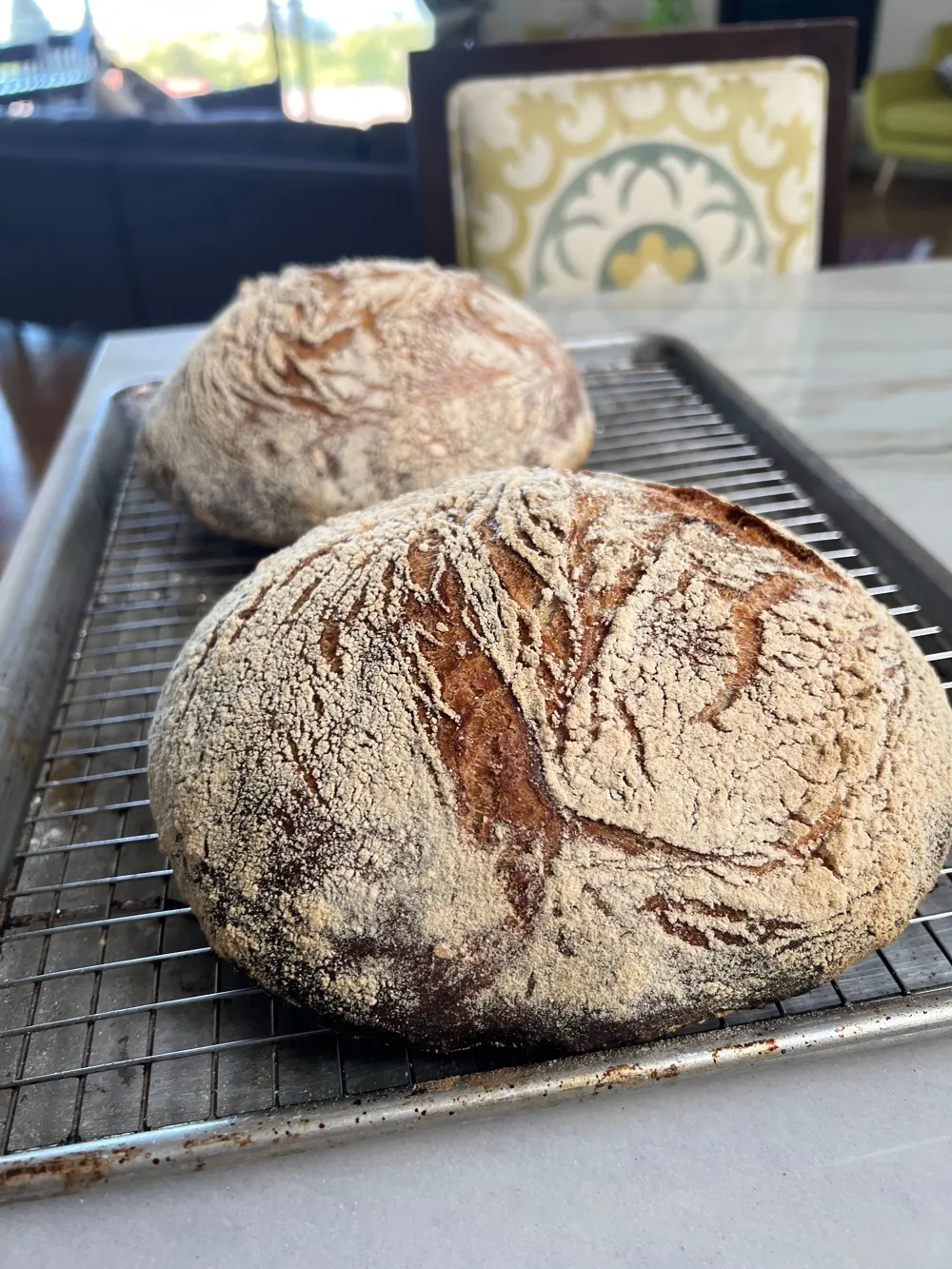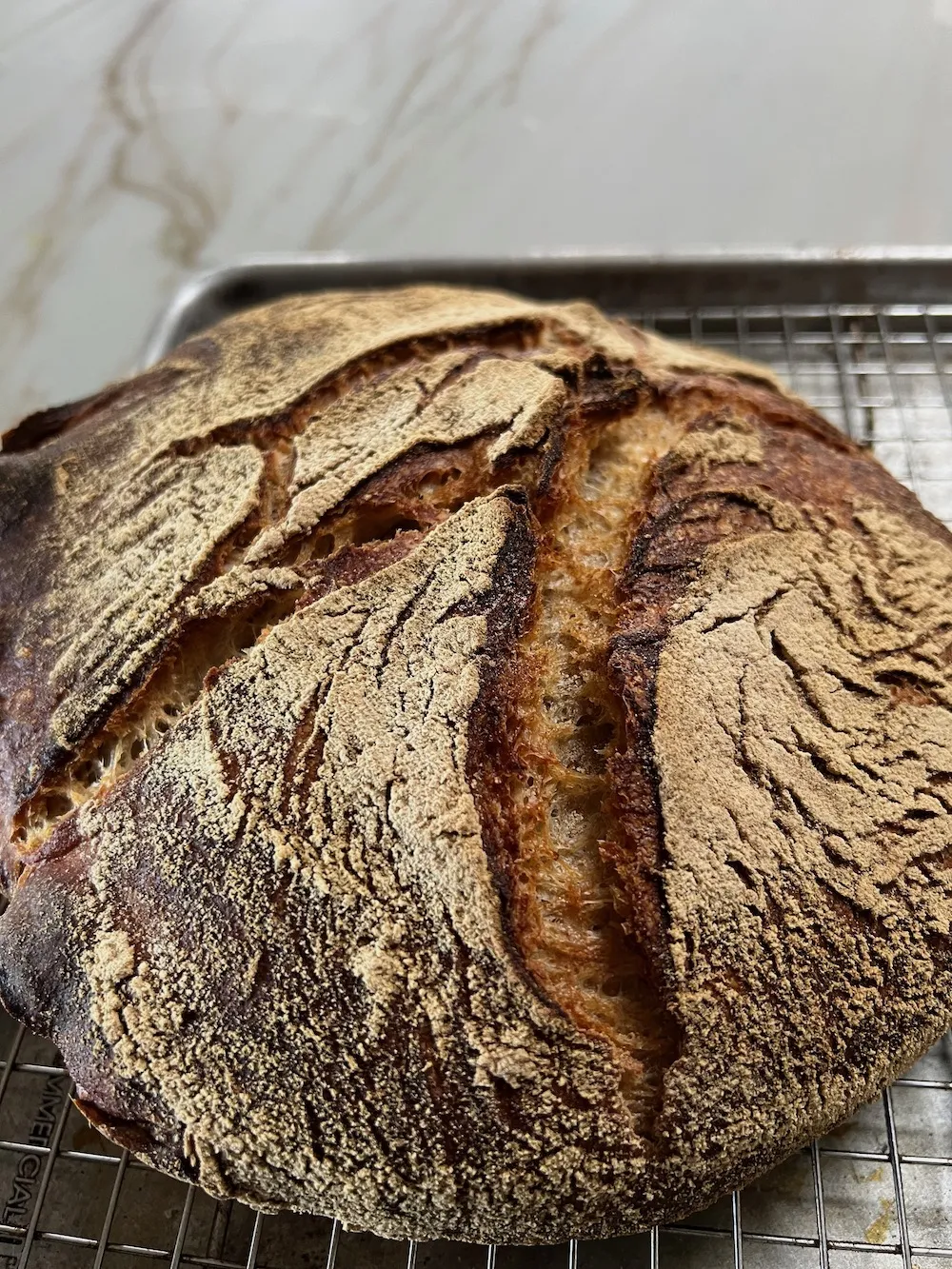Hey Folks,
I have been baking regular bread (non levain) for a bit and I enjoy it but I have been wanting to get into sourdough baking. I have tried it in the past and I didn't fare well. By that I mean the entire process went pretty much by the book (Ken Forkish - Flour, Water, Salt, Yeast). I felt pretty good about it until the bread came out of the oven. It wasn't entirely flat but I didn't get the rise I was expecting. Need some help with what I might be doing wrong?
Overnight Country Blonde
I have a starter that I have been feeding now for a few weeks. I keep it in a temp controlled styrofoam box in a glass jar and feed it regularly with white flour. After feeding the levain for about 8-9 hours at 73 degrees I started the autolyse process:
- 804 grams of white flour, 50gms of Rye flour, 26 grams of whole wheat and mixed it by hand. To that I added 684 gms of 90 to 95 degree water, again mixed by hand and let it sit covered for 30 minutes.
- Final dough was mixed by adding 22 gms of salt and 216 gms of the starter that floated on water very nicely.
- Folds: 3-4 folds before I put it away in the same temp controlled container for about 14 hours or so.
The dough rose and tripled in size and looked great. When I removed the dough to a work surface it was quite sticy but I managed to shape the dough into 2 medium tight balls and set them in the basket, seam side down, covered them and let them rise for about 4 hours at roughly 70 degrees. Did the proof test and in advance got the oven going with my dutch ovens at 475.
All good to this point. I baked them covered for 30 minutes and uncovered for another 30 minutes. Attaching photos. The taste was good. The first photo is from my first try and the second 2 photos are from second try. I find both of these breads to taste pretty good, good chewy crust and has a decent crunch. The bread though doesn't rise as much I would like to. What am I doing wrong?



You don't explain what you expected, what you got, and what the difference was... there is no cross section shot of your crumb
also white flour for a starter? if it's storebought it might be weak. You never explain your starter or how much it grows, what it looks like, or how you determine maturity / readiness. for instance, dark rye would be more powerful for starters
you mention levain but don't explain it. levain is not starter of course
maybe you are expecting people to go read the book to fill in the gaps?
if you provide more, clear information, people may be able to help
My apologies for. making assumptions. I was expecting a rounder, bigger loaf. The loaf could have risen more than I expected. I am attaching photos of some of the slices from the bread. When you see a loaf from some of the photos that I see on TFL or even at a bakery, they are rounder and a bit bigger. I am getting close but wanted to know what I could be doing wrong. I know for a fact that my dough is hard to handle as it is sticky and wetter than what I have seen in instruction videos.
- 24 hours after previous feeding of the starter, I fed it again in the morning around 8 AM. By 6 PM or so it had risen nicely. The white flour is from Shepards Grain and I initiated the starter from scratch. I determined maturtiy by using the float test, which like I stated, was flawless. The starter also was webby and had a nice strong texture to it.
- After reading some responses, I think I might be overthinking the temp. The ambient temp in my kitchen this time of year hovers between 65 & 68 degrees. Overnight temps are closer to 64-65 and day time is around 68 & if it is a warmer day around 70. I put the dough in a styrofoam container for about 14 hours at 70 degrees and I think that may have caused it to become a bit difficult to handle.
How does it taste?
It has a nice soft texture to it, a bit drier than I would like but again, I am just learning and this is my 3rd attempt at baking sourdough. I do pretty well with Poolish and other commercial yeast type breads.
you are doing anything wrong. Those boules look pretty good to me.
If the starter is indeed healthy and vibrant, 14 hrs at that temp is way overkill. Enjoy!
I agree with the other comments that it would be helpful to see a photo of the interior, and some additional info about your starter process. I was a little confused by you saying you fed the levain for 8-9 hours at a warm temp. If you are referring to your starter feed/preferment/levain, I am assuming you are feeding a healthy starter to use in a dough. It usually takes a healthy starter about 3-4 hours to double or triple, meaning it is ready to be added to your autolyse/dough. If you are making a true levain, once mixed it isn't usually 'fed' again before being added to the main dough unless you are building up quantities from a small starter to make several loaves. Some clarification there would be very helpful. It is possible your starter is a bit taxed if it has actually been sitting for 8-9 hours after being fed, even though it will float--I don't use the float test but just wait for the fed starter to reach double or triple in height and have a slight rounded dome top, usually around 3 hours for me. Unless you live in a very cool environment, the temp controlled container for your starter and for extended proofing is probably not working to your advantage.
A combination of issues are likely at work here then: tired, warm starter, warm water, warm proofing, extended proof time, and not enough strength built into the dough. It is most likely the dough over-fermented--the stickiness and lack of rise you describe fits that. If my math is correct (and your 'levain' (starter feed) was initiated 8-9 hours before), you attempted a VERY extended total ferment/proof time, at room temp or higher, without any cold retarding in a fridge, for at least 26 hours+, without factoring in how long you took to do stretch and folds. This is going off of you stating 14 hours post S&F and 4 hours post shaping...all at room temp or in the temp controlled environment. In my experience (and there are many others here with loads more...hopefully they will weigh in too), that is asking way too much of your starter and dough. Extended proofing times usually do best with a significant portion of that time spent in a cold environment, like the fridge, rather than in a warm one. Although over-proofed dough rises and looks nice and puffy, once you try to work with it...problems! I've had similar issues when trying to multi-task while trying to make bread in a warm kitchen--it can over-ferment and/or proof very quickly.
Apologies in advance for the long comment, but you indicated you were a newbie and were looking for some input. Hopefully you will find a nugget of helpfulness somewhere buried in all the blah, blah. Keep on baking!
I really appreciate your guidance. My loaves are proofing right now and I can already tell that the dough that sat out for about 13 odd hours at room temp of about 67 was much easier to handle. I will know in a few hours if this the boule's come out better. Again, thanks for taking the time to explain.
Great to hear! How'd they turn out? More like what you were hoping for? I don't have any experience with that particular recipe, but it sounds like (based on others' comments) it is fraught with challenges! Fingers crossed everything worked out better for you ;-)
have written about Forkish's tricky sourdough formulae. Do a search on TFL. You'll find lots of commentary. To quote one post from 2019: "while the dough rises during the proofing phases, it flattens out entirely while I'm baking it....I don't seem to have this problem when I make the hybrid levain breads (commercial yeast + levain). I get nice round loaves."
Personally, I found the techniques in FWSY to be way out-of-reach in my crowded, stuffy NY kitchen. The levains and doughs rose like crazy--often blasting out of their bowls. They never seemed to tighten during stretch & folds. And they spread horizontally rather than rise vertically in the oven, even after refrigeration. That being said, if I had gotten the results you show in your post, kmsutra, I would not be complaining. They look great to me.
The general advice from those with tremendous knowledge has been: watch the dough, not the clock.
Rob